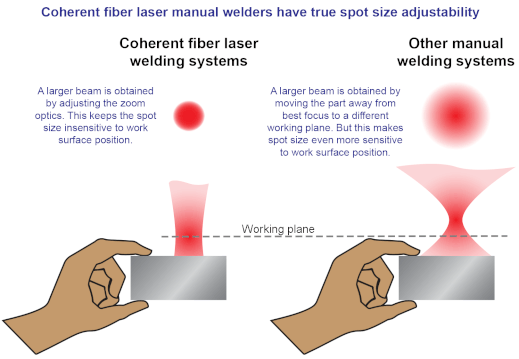Manual laser welders offer an easy way to produce very precise, high-quality spot and seam welds on metal parts. Typically, the user just handholds the part in a working chamber and then traces out the weld pattern while looking through a microscope. The laser is triggered using a foot pedal. This eliminates the need to make tooling or specialized fixturing for holding and moving the part. This simplicity, and ability to use the system with essentially no setup time, has made manual laser welders very popular with manufacturers who produce prototypes, “one-off” pieces, small batch sizes, or who perform repair work.
Fiber lasers improve weld quality
Coherent Performance Series Manual Welders based on patented flashlamp-pumped Nd:YAG lasers deliver a great combination of weld quality and value for most users. That’s why they’ve become so popular in medical device manufacturing, jewelry manufacturing, and repair, and in job shops.
Fiber lasers offer even better optical performance than these Nd:YAG lasers, but they’re also more expensive. However, for those applications where precision, weld quality, and consistency are most critical – like in medical device manufacturing or aerospace – the bump up in performance achieved with a fiber laser is well worth the cost. That’s why Coherent is happy to now add a fiber laser option to all of our Performance Series Manual Welders.
Fiber laser welders are easier to use
One of the key advantages of the fiber laser is improved beam quality. This increases the depth of focus of the system, which gives the operator more leeway for where they hold the part. So, the welding process is more robust and less dependent on the individual user.
This higher beam quality also enables us to use true zoom focusing optics for adjusting the focused laser spot size. In the past, the welder just moved part away from the point of best focus to change spot size. But, this makes the system really sensitive to any further changes in part position and therefore much less repeatable and operator dependent. Our zoom optics eliminates that problem, and you won’t find them on manual laser welders from any other manufacturer.

We’ve also configured the beam guiding optics to have a “flat-top” laser focus rather than Gaussian intensity distribution. This reduces spatter and produces a smoother weld. And, a uniform power distribution also makes it easier to find the power level that delivers the best results for a particular job.
Fiber laser welders improve consistency
The other big advantage of a fiber laser is that it offers much better pulse-to-pulse consistency and long-term stability than a flashlamp-pumped Nd:YAG laser. Also, fiber lasers virtually never “miss” a pulse, which can be a problem with Nd:YAG. Knowing that the weld seam is consistent and doesn’t have any voids (due to missed pulses) is a really big deal when making medical products, or anything else where part failure has severe consequences.
We’ve even gone one step better with an option for an integrated power monitor. This logs the data from every single laser pulse and gives the manufacturer total traceability and documentation for their welding process.
Our fiber laser-based welders also extend the user’s ability to match laser pulse shape to the thermal behavior of the particular material being welded. For example, the laser pulse might be configured to quickly rise to its peak power – this melts the material and starts the welding process – but then taper off slowly for a “cool down” to avoid microcracking.
Laser welding delivers a number of benefits over other joining technologies. Manual laser welders have long offered a low-cost entry point into this technology, along with an operational flexibility that makes them ideally suited to short-run manufacturing. Now, Coherent Performance Series Manual Welders with fiber lasers offer this same convenience and ease-of-use – along with improved process consistency, yields, reliability, and traceability – to service the most demanding applications.

